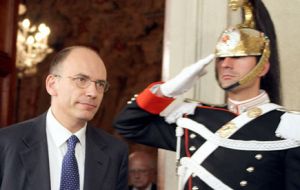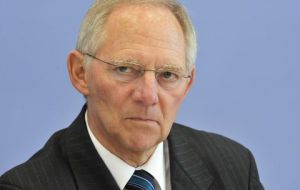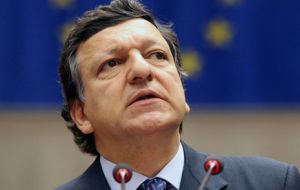MercoPress. South Atlantic News Agency
With Berlin’s blessing EU begins new track arguing “austerity option exhausted”
 Italy’s PM Letta (Berlusconi) and Spain first test cases
Italy’s PM Letta (Berlusconi) and Spain first test cases  “You have to react to economic developments -- we do so in Germany” said Schaeuble
“You have to react to economic developments -- we do so in Germany” said Schaeuble  “Budget-cutting has run its course” anticipated Barroso in a speech in Belgium
“Budget-cutting has run its course” anticipated Barroso in a speech in Belgium Europe is expected to accelerate a shift away from its austerity-first agenda this week as the new Italian government changes course and a German-Spanish investment pact underscores a renewed focus on combating record unemployment. This comes on the background of much criticized statements from European Commission president Jose Barroso who said ‘austerity was over’.
Last week Barroso spurred a debate last week when he said that while consolidation is necessary, budget-cutting had run its course. “We are reaching the limits of the current policies,” Barroso told an audience in Brussels.
The inauguration of Italian Prime Minister Enrico Letta ends a political deadlock nine weeks after voters rejected the country’s budget-cutting course and adopted the “grand coalition” promoted by former PM Silvio Berlusconi and his tax easing policies. German Finance Minister Wolfgang Schaeuble, a champion of austerity, arrives on Monday in Spain to unveil a plan aimed at spurring investment in Spanish companies. Later this week, the European Central Bank may also cut interest rates at a meeting.
The new Italian government’s pledges to dismantle parts of the budget-cutting project undertaken by ousted premier Mario Monti open a new front in the debate over the German-led policy of austerity to overcome the bloc’s debt crisis. As the 17-member Euro area remains mired in recession, European leaders are joining global critics in urging the bloc to devote more resources to boosting economic growth.
Letta of the Democratic Party, at 46 the third-youngest Italian leader since World War II, came into office after sealing an alliance with former premier Silvio Berlusconi and recasting the coalition that stood behind Monti.
One of the first tests of the new partnership may be a property tax that three-time premier Berlusconi has vowed to eliminate. Berlusconi said this weekend that Letta had agreed to abolish the measure on first homes and reimburse last year’s payment, a move he said may cost about 8 billion Euros. Letta has not confirmed the agreement and his first Cabinet meeting didn’t address it, according to his office.
Scrapping the unpopular tax would mark a challenge to European leaders’ preference for fiscal belt tightening at a time when it has come under increased criticism for compounding economic distress.
Last week Barroso spurred a debate last week when he said that while consolidation is necessary, budget-cutting had run its course. “We are reaching the limits of the current policies,” Barroso told an audience in Brussels.
While the comments drew ire from German lawmakers in Chancellor Angela Merkel’s coalition, Germany’s government said that Barroso’s position was in accord with Berlin and stressed that Europe must be flexible in how it responds to economic distress.
German Deputy Finance Minister Steffen Kampeter said last week that the bloc’s budget rules “aren’t rigid.”
Schaeuble offered the latest signal that Merkel’s government is adjusting its crisis stance in comments late last week. He said he’ll use Monday’s meeting in Madrid with Spanish Economy Minister Luis de Guindos to push for an investment program that sidesteps the EU Commission.
The plan, announced on the same day that Spanish Prime Minister Mariano Rajoy said he was seeking a two-year extension to meeting EU deficit rules, could serve as a model for other countries suffering with battered economies, Schaeuble said.
“If the economy deteriorates, you don’t reinforce the economic downturn through deeper cuts,” he said.
“You have to react to economic developments -- we do so in Germany,” Schaeuble told members of Merkel’s Christian Democrats Union in Berlin last week. “We are not bureaucratic; we are not stupid.”
The ECB may also pull its weight. The Frankfurt-based bank is expected to lower its benchmark rate to a record 0.5% when central bankers meet on May 2 in Bratislava.
But as Merkel approaches national elections in less than five months, softening her stance on indebted nations in the Euro area will pose a challenge.




Top Comments
Disclaimer & comment rules-

-

-

Read all commentsThese idiots have ni idea what to do. They never have and never will know what to do for anything that is seen as a challenge.
Apr 29th, 2013 - 02:05 pm 0We should leave the EU immediately.
The UK cannot afford to spend more money on the useless civil service who are neither a service nor civil anymore.
The NHS should be broken up and privatised and private health care mandatory except for the real down-and-outs and there should be a fine levied when people miss appointments at the doctors unless there is a very good reason.
Some of the billions saved should go to bolstering the armed forces BUT not just to play poodle to the USA, not while the twat Obama is POTUS.
With Berlin's blessing, that is a joke surely and certainly does not apply to the UK.
Apr 29th, 2013 - 06:44 pm 0@1. That all sounds a bit radical, I think compared to other countries we get a pretty good service from our Police and NHS. As for the armed services, is 160 billion budget not enough, I think it is personally.
With respect to the EU, I agree we need to leave pronto, that ship is heading for the rocks.
they are all liars,
Apr 29th, 2013 - 07:04 pm 0they know that coruption is out of control,
and mearly trying to ofset their incompetence with our money,
we say
out out out,
yet this thursdey we will see if UKIP can climbe the steps to a true bigger and honest party..
we will wait and see..
Commenting for this story is now closed.
If you have a Facebook account, become a fan and comment on our Facebook Page!